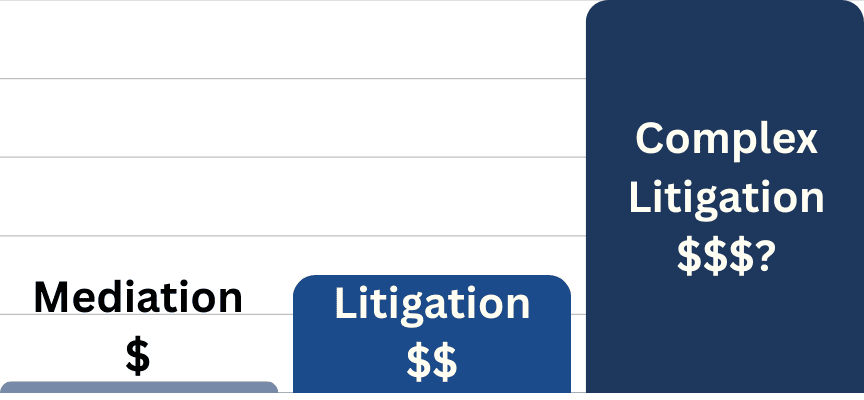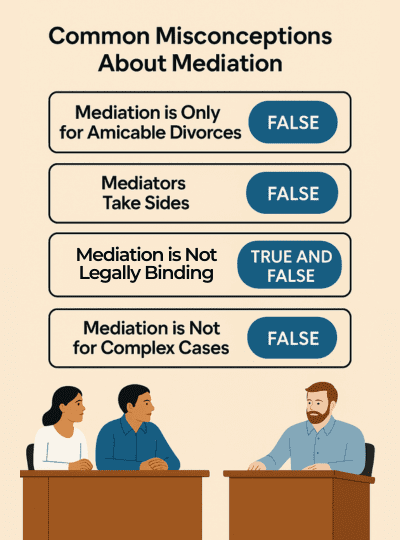Divorce is often seen as a contentious, expensive, and emotionally draining process, especially when traditional litigation is involved.
However, there’s a smarter, less stressful alternative.
Divorce mediation offers an amicable, cost-effective, and collaborative approach to handling divorce cases.
By choosing mediation, divorcing couples can resolve their divorce issues with less conflict, more control, and significantly lower legal fees.
In this article, we explore the benefits of divorce mediation, how it works, and why it might be the best option for you and your family.
A Cost-Effective Path to Divorce
One of the most significant benefits of divorce mediation is its affordability compared to traditional litigation.

Think about it this way:
In traditional divorce proceedings, both parties typically hire their own divorce lawyer, leading to mounting attorney fees and prolonged court proceedings.
Mediation, however, streamlines the process.
During structured mediation sessions, both parties work with a single neutral third party, a divorce mediator, to reach a fair and amicable agreement.
By reducing the number of court appearances, lengthy negotiations, and duplicative legal fees, mediation helps divorcing spouses save money and avoid costly delays associated with the court system.
For a deeper look at the cost comparison between mediation and litigation, please check out our article: Divorce Mediation vs. Lawyer: Which Is Right for You?
Resolve Things More Quickly
Divorce mediation typically delivers a faster resolution than traditional divorce litigation.
Court cases can drag on for months or even years, with multiple court dates, extensive paperwork, and delays.
In contrast
Structured mediation sessions are scheduled at the convenience of both parties.
With guidance from a professional divorce mediator, couples benefit from quicker problem-solving and more effective conflict resolution, helping them reach a timely agreement.
Note: A mediator cannot give legal advice. So, you may want to bring your lawyer to mediation.
This streamlined approach significantly reduces the emotional stress associated with prolonged divorce cases, allowing you to finalize your divorce agreement and move forward sooner.
It’s a Confidential Process
Unlike traditional litigation, which can expose sensitive details in the public record, divorce mediation is entirely confidential.
Here’s why this matters: All discussions and negotiations during your mediation sessions remain private and confidential.
This protects sensitive personal information, financial information, and family matters from unnecessary public exposure.
Only the final agreement, a Memorandum of Understanding, if filed with the court, becomes part of the public record.
This confidentiality is especially beneficial for high-conflict divorces or for parties who want to keep their financial and personal matters out of the public eye.
A Less Stressful Environment
The mediation process is designed to be less adversarial and more collaborative than traditional litigation.
Instead of a judge imposing decisions, mediation encourages open communication, cooperation, and creative solutions tailored to the needs of both parties.
This collaborative divorce approach reduces stress and allows divorcing couples to focus on finding common ground.
This benefit is especially vital when children are involved. A less stressful divorce process fosters better co-parenting dynamics and preserves family relationships.
Greater Control Over the Outcome
One of the primary benefits of mediation is the ability for both parties to maintain greater control over the outcome of their divorce.
In a litigated divorce, a judge makes the final decision on issues such as spousal support, property division, and child custody.
However
In mediation, the mediator’s role is to facilitate discussions and guide divorcing spouses toward mutually agreeable solutions, giving both parties more influence over their own lives.
This decision-making power often leads to more customized, satisfactory outcomes that better reflect the unique needs of each family.
Helps Preserve Relationships
Divorce doesn’t have to destroy relationships, particularly when children are involved.
Divorce mediation fosters a more cooperative atmosphere, helping to preserve relationships and minimize conflict.
By focusing on problem-solving rather than confrontation, mediated divorce encourages both parties to work together toward solutions that benefit their children.
This collaborative approach sets a positive tone for future interactions, which is especially important for successful co-parenting.
Allows For Customized Solutions
Unlike the traditional divorce process, which often applies one-size-fits-all solutions, mediation allows couples to create customized solutions that address their specific circumstances.
Whether it’s developing a parenting plan that suits both parents’ schedules or crafting an equitable asset division, mediation gives divorcing spouses the flexibility to shape their divorce agreement in a way that works best for their family.
This tailored approach often leads to satisfying creative solutions that may not be possible in a court setting.
How Divorce Mediation Works
Understanding how the divorce mediation process works helps you determine if it’s the right choice for your situation.
Initial Consultation
The process starts with an initial consultation.
During this meeting, both parties consult with a qualified divorce mediator to learn about the mediation process, clearly identify key divorce issues, and set ground rules for moving forward.
Depending on how the mediator’s office operates…
You may initially meet with a paralegal or legal assistant individually or jointly instead of directly with the mediator.
This preliminary session ensures that both parties clearly understand expectations, laying the groundwork for productive mediation sessions.
Mediation Sessions
During mediation sessions, the mediator’s job is to facilitate focused discussions on key divorce issues.
Including:
- A Parenting Plan
- Child Support
- Spousal Support
- Property Division
- Other Relevant Issues
The mediator ensures that both parties have the opportunity to voice their concerns and that both negotiate in good faith.
The number of sessions required depends on the complexity of the case and the willingness of the parties to reach agreements.
Drafting the Agreement
Once agreements are reached on some or all issues, the mediator drafts a Mediation Agreement or Memorandum of Understanding (MOU).
This document outlines the terms of your agreement, including matters such as custody arrangements, spousal support, and asset division.
Both spouses then review the drafted agreement carefully, ensuring it accurately represents their decisions and intentions.
Legal Review and Finalization
After the mediation agreement is drafted, it’s recommended that both parties have it reviewed by a family law attorney to ensure it complies with state laws and protects their rights.
Once reviewed and finalized, the agreement is submitted to the family court for review and approval.
After it is approved, the court incorporates the agreement into the final divorce decree, making it legally binding and enforceable.
For a more detailed look at the mediation process, check out our article: Understanding the Divorce Mediation Process.
Who Should Consider Divorce Mediation?
Divorce mediation is a good option for many couples, but it may not be suitable for everyone.
Consider mediation if:
- You want to avoid the high costs and stress of the court process.
- You have children and want to work together to create a cooperative parenting plan.
- You’re dealing with complex financial issues, including retirement accounts, real estate, and other financial matters that require tailored solutions.
- You are seeking a faster, less adversarial resolution to your divorce.
Considering mediation? Our Divorce Mediation Checklist will help you prepare!
Common Misconceptions About Divorce Mediation
Despite its many advantages, several misconceptions about divorce mediation persist.
Here are some of the most common:
Mediation Is Only for Amicable Divorces
Many people believe mediation only works for couples on good terms, but mediation can also be effective in high-conflict situations.

A skilled mediator can manage conflict and facilitate effective communication, even when couples start with significant disagreements.
In fact, Colorado courts will almost always require mediation in family matters.
Mediators Take Sides
A common misconception is that a mediator may favor one party.
In reality
Mediators are neutral third parties whose sole job is to ensure fair, balanced discussions.
They do not take sides or make decisions; they simply guide both parties toward a resolution.
Mediation Is Not Legally Binding
Some believe that mediation agreements are not legally binding.
While the mediation sessions themselves are informal, the final agreement, once reviewed by an attorney (optional but recommended) and approved by the court, becomes a legally enforceable divorce settlement agreement.
Mediation is Not a Good Option for Complex Cases
With a good mediator, a strong attorney by your side, and proper preparation, even the most complex cases can be resolved through mediation.
However
It may require a longer mediation session or multiple sessions to come to a full agreement.
Still weighing your options? Learn the difference between mediation and arbitration to better understand your alternatives.
Why Mediation Is the Better Option
The benefits of divorce mediation are numerous:
- More Cost-Effective
- Faster Resolutions
- Confidentiality
- Reduced Emotional Stress
- Greater Control for Both Parties
Bottom line: For many, mediation is the smartest way to avoid the emotional strain, public exposure, and high financial costs associated with traditional divorce litigation.
If you’re considering divorce…
Mediation offers a smarter, more amicable solution that promotes positive post-divorce relationships (important when you have children), and customized solutions tailored to your family’s needs.
Mediation provides the best opportunity to end your marriage with an outcome you can live with, and that leaves more money in your pocket.
If you’re ready to explore the benefits of mediation, please fill out the form below.



